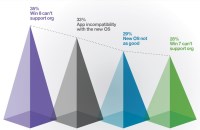Welcome to the Post-XP world, but how on earth did we get here?

There hasn't been such a build-up of pointless excitement since the Year 2000 bug threatened to destroy civilisation as we know it. Of course, Microsoft ending support for its aged and insecure Windows XP operating system never threatened anything like that, regardless of the XPocalypse-style billing. The real risks are in the longer term, and will probably affect large enterprises and governments. Or at least, those are the ones that will be reported.
There is a real risk that malware creators will be able to exploit XP, but it remains to be seen how well its users will be able to defend it. The fact that they couldn't manage a relatively simple (in most cases) upgrade on time, even when given almost seven years advance warning, suggests not.
The idea that specific applications are preventing upgrades doesn't hold much water. Yes, in a survey of 250 IT Decision Makers from large companies published yesterday by Camwood, a specialist in software management and migration, 33% blamed "application incompatibilities". However, competent IT managers would have known they had a problem when their programs didn't run on the new architecture introduced with the beta version of Windows Vista in 2005. Did they test them? Did they — and their software suppliers — think any problems would magically go away? This defies logic.
Competent IT managers must also have realised that persisting with Windows XP was costing them money, and that they would have increased productivity by upgrading to Windows 7 as soon as possible. It just works better. It's more stable, more resilient, better at multitasking, needs far fewer reboots, and is more resistant to malware. And if they have a deal like Microsoft's Software Assurance, the upgrade wouldn't cost them anything.

By upgrading to Windows 7 as soon as possible (2009), companies could have run the same OS version for 11 years, because Windows 7 support ends in 2020. Instead, many apparently chose to spend up to 13 years on the inferior operating system, and six years or less on the superior one. The fact that some IT managers are still claiming — on Camwood's numbers, see chart right and below — that "Windows 7 cannot adequately support my organisation" (28%) defies logic. Do any of them actually believe that?
Further, it's unlikely that many of the PCs still running XP are more than five years old, because PC hardware tends to start failing after five years. Since Windows 7 came our more than four years ago, most of these PCs were designed to run Windows 7, or at least Vista. Why did companies downgrade them to XP? Just replacing old XP machines with new Windows 7 machines would have accomplished the required upgrade in a seamless fashion. Indeed, Microsoft provided a free copy of XP with Windows 7 Pro so that companies could do this by running virtual copies of XP to cover the odd out-of-date program.
Historically, corporate IT departments and government services have tended to insist on a single operating system to reduce support costs, and if so, I'd love to see the numbers. How did the savings in support measure up against the lost productivity, and the huge cost of either upgrading to Windows 7 in a hurry (when migration specialists were in short supply and consequently expensive) or, yesterday, running through the buffers?
In any case, the insistence on "a single operating system" went out of the window a couple of years ago, when BYOD (Bring Your Own Device) gained traction. Are we supposed to believe it would have been impossible to run XP and Windows 7 side-by-side when it's apparently possible to support Windows PCs, Macs, tablets and several incompatible types of smartphone? Really?
Although the XPocalypse will not have any immediate effects — XP will continue working normally, until it's hacked — it's obvious that we are now in an era of constant and accelerating change. Most operating systems and browsers will not stay the same for five or 10 years, and many will be upgraded once a year or perhaps even more frequently. Not even Microsoft is operating on a three-year cycle: witness the speed with which Windows 8 was followed by Windows 8.1 and then yesterday's Windows 8.1 Update 1.
The speed of change is even more rapid with online services, which can change every few months — usually for the worse.
According to Camwood's report, 90% of these IT managers believe that the pace of change is accelerating, and 72% find this "unsettling". However, "93% also agree that, in the new IT environment, a flexible IT infrastructure is key to their organisation’s success". (To be picky, the pace of change has been accelerating for decades, but many of them were ignoring it.)
What's driving the need for more agility in corporate IT? The survey says it's things like Big Data (65%), cloud-based services (50%), BYOD (41%), and users demanding the consumerisation of IT (24%). In this context, upgrading from Windows XP to Windows 7 doesn't sound like a big deal, does it?
Camwood's CEO, Adrian Foxall, says in a statement: "The death knell of Windows XP probably marks the last great ‘monolithic’ migration event. The new norm will be constant, successive change, due to ever-closer OS releases, and rapidly changing IT strategies and delivery methods. IT departments must be quick to react to this brave new world. Those who fail will rapidly fall by the wayside."
Camwood's white paper, How to adapt to the accelerating pace of IT, is available free. A link will be sent to the email address you provide.
Read more on Windows XP
- Windows XP dies at 12 1/2 after long illness
- Windows XP support end: 10 steps to cut security risks
- The end of XP support: The complete guide for stayers and switchers